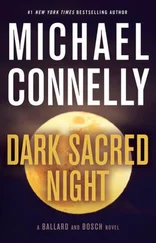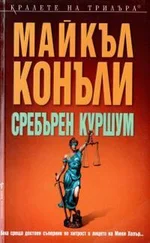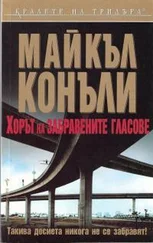Cisco reluctantly took it.
“This is cash? You just want to give it to me?”
Cisco looked around the yard and through the fencing to the outside streets. Bosch realized how it might look to anyone watching.
“Shit, I’m sorry. I wasn’t thinking.”
Now Bosch looked around. He saw no sign of surveillance, but he probably wouldn’t have.
“No worries,” Cisco said. “For a good cause.”
“So, you’ll handle that?” Bosch asked. “You’ve been paying forward, backward, and sideways with this.”
“I don’t mind. We’re doing a good thing. You want to go in now?”
“You know what? I was thinking maybe I shouldn’t. If she’s going to get agitated, then she doesn’t need to see me. I don’t want to set her off.”
“You sure?”
“Yeah, if she’s doing good, keep her doing good. I’m happy with that.”
Cisco tossed the sock up and then caught it.
“Let me guess,” he said. “Earthquake money?”
“Yeah,” Bosch said. “I thought, what the hell, put it to good use.”
“Yeah, but you know you just jinxed the whole city. As soon as you spend the earthquake money, the big one hits. Everybody knows that.”
“Yeah, well, we’ll just have to see. I’ll let you get back to it. Thanks, Cisco.”
“No, thank you. And someday I think she’ll be doing the thanking.”
“Not necessary now, not necessary then. Let me know how it goes with that other place if you get her in.”
“Will do.”
After driving away, Bosch cut west and went by the Start after Googling its location on his phone. He could tell it had once been a Holiday Inn or some other midrange hotel. It was now painted stark white. It looked clean and cared for — at least on the outside. He was happy with that.
He kept driving and started heading home. Almost the whole way he thought about his decision not to go in and visit Elizabeth Clayton. He wasn’t sure what that meant or what he was doing. She had tapped into a need he had to reach out and help someone, whether they welcomed his help or not. He was sure that if he sat down with a shrink for an hour — maybe his longtime LAPD counselor Carmen Hinojos — there would be a whole raft of psychological underpinnings to his actions. And the money. He had very specifically committed funds that would not upset any financial aspect of his life. So was there a sacrifice in that?
There had been a time when Bosch as a boy, obviously wanting to escape his life in youth halls and foster homes, had become fascinated with the great explorers who had discovered new lands and cultures. Men who had left their places and stations in life to find something new or to stand against something old, like slavery. As he traveled from one bed to another, the one thing he carried from place to place was a book about the Scottish missionary and explorer David Livingstone, who had done both. Bosch didn’t remember the title of the book anymore but he remembered many of the ideas the man espoused. Over time he had cemented them like a mason into his own belief system and they formed the brick foundation of who he was as both a detective and a man.
Livingstone had said sympathy was no substitute for action. That was an essential brick in Bosch’s wall. He had built himself as a man of action and, at the moment when the integrity of his life’s work had been called into question by a man on death row, he had chosen to turn his sympathy for Elizabeth Clayton into action. He understood that but was unsure if anyone else would. They would see other motives. Elizabeth would as well, and that was why he had chosen not to see her.
He knew he had done what he needed to do and that he would probably never see her again.
It was only nine when he reached home, but Bosch was exhausted and looking forward to crashing into his bed for the first time in almost a week. He got in, checked the locks, and put the broomstick back into the track of the deck slider. He then walked down the hall, dropping his jacket and shirt on the floor as he went.
He finished getting undressed and crawled onto the bed, ready to completely succumb to sleep’s rehab and restoration. When he reached over to the clock so he could push the daily six a.m. alarm back a couple hours, he saw a folded envelope on the bed table. He unfolded it to find that it was addressed to him at the SFPD station.
He suddenly thought someone had been in the house and put the envelope there for him to find. Then his weary mind focused and he remembered placing the letter there three nights earlier. He had completely forgotten about it and had not slept in the bed since.
He decided the letter could wait until morning. He adjusted the alarm, turned off the light, and put his head between two pillows.
He lasted no more than thirty seconds. He pulled the top pillow away, reached up, and turned the light back on. He opened the envelope.
It contained a folded newspaper clip. It was a San Fernando Valley Sun story from almost a year earlier, reporting on the department’s renewed effort to find out what had happened to Esmerelda Tavares. Bosch had given the interview to a reporter for the local weekly, hoping to spawn feedback and possible information from the public. A few tips had come in but nothing of merit, nothing that panned out. And now a year later, this letter.
The clip was accompanied by a piece of white paper folded three times. In a handwritten scrawl it said,
I know what happened to Esme Tavares.
The note included the name Angela and a phone number with an 818 area code.
The Valley.
Bosch got up and reached for his phone.
Angela Martinez, the author of the note to Bosch, turned out to know exactly what had happened to Esmerelda Tavares because she was Esmerelda Tavares.
On Wednesday night, Bosch had called the number on the letter he had received, and the woman who identified herself as Angela said she would meet him at nine the next morning at her home in Woodland Hills.
The woman who answered the door of the condo on Topanga Canyon Boulevard was blond and in her midthirties. Bosch had spent a lot of time over the previous two years looking at photographs of the dark-haired, dark-eyed Esme Tavares of fifteen years before. He had one shot of her, her lips pursed in a pout, posted in the cell so that he would always be reminded of the case. He had chosen the pout photo out of all the rest because he knew the set of a person’s closed mouth changed little over time. The woman who called herself Angela wasn’t smiling when she answered the door, and he knew right away that she was Esme.
And she recognized that he knew.
“You have to stop looking for me,” she said.
They sat in her living room and she told him her story. Once she got going, he could have filled in the details ahead of her, but he let her tell it just the same. Young woman caught in a bad marriage to an older, dominating man; physically abused regularly and tied to a baby she never wanted to have — that her husband wanted only as a means of controlling her. She made the hard choice to leave everything behind, including the child, and disappear.
She had help, and when Bosch probed deeper with his questions, it became clear that help came from a lover she had had on the side at the time and had now lived with for fifteen years. They had first moved away and lived in Salt Lake City together. They came back ten years later because both missed the city where they had grown up.
Her story had more holes in it than a San Pedro fishing net but Bosch thought the omissions and incongruities were designed to cast her in the best light in a place of deep shadows. She seemed to show no guilt about the daughter she had left in a crib or about the efforts of the community to find her. She professed to be unaware of all of that because she was then living in Salt Lake City.
Читать дальше
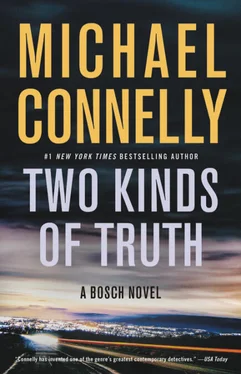




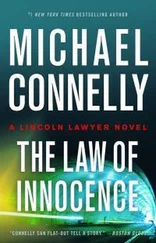

![Майкл Коннелли - The Night Fire [Harry Bosch - 22]](/books/405630/majkl-konnelli-the-night-fire-harry-bosch-22-thumb.webp)
